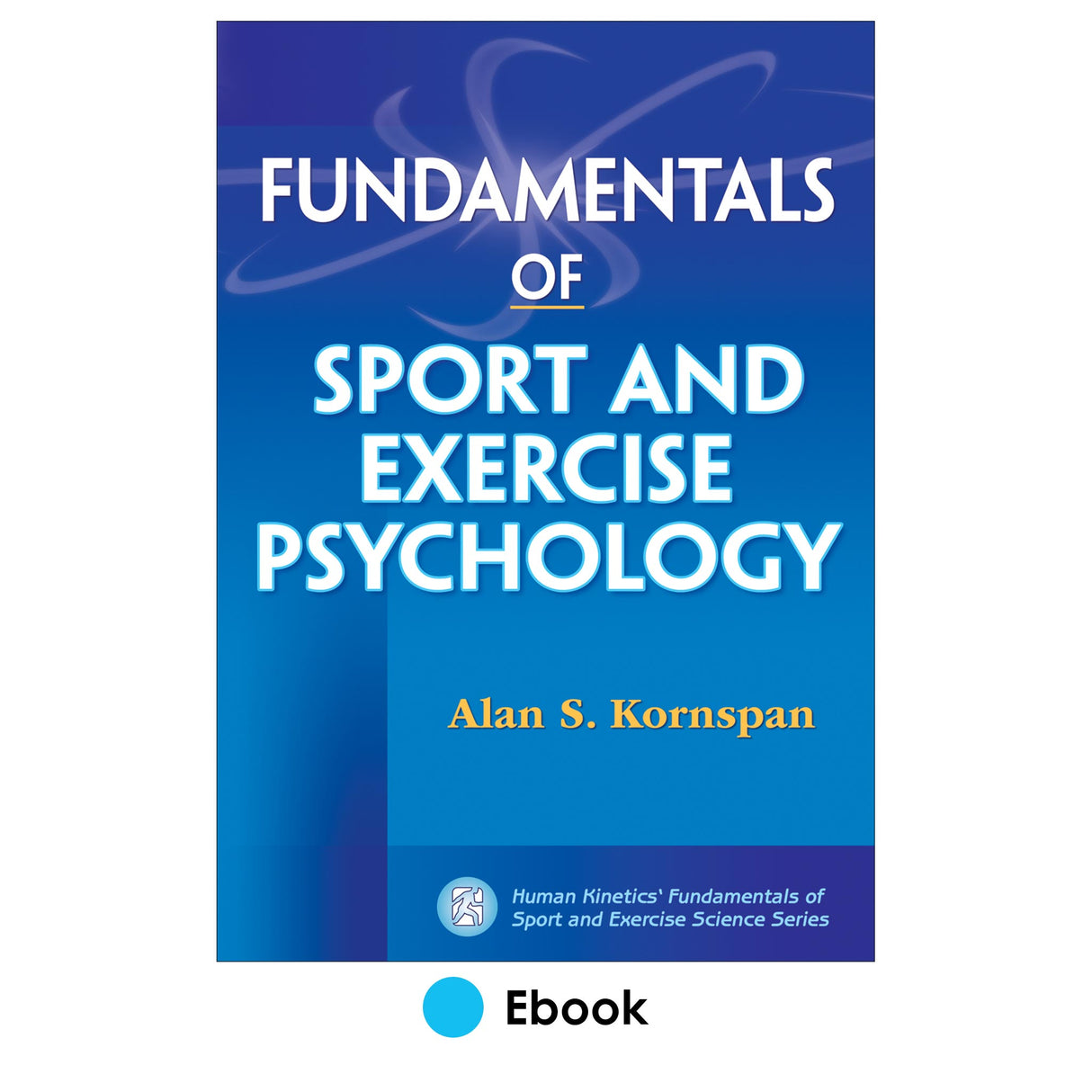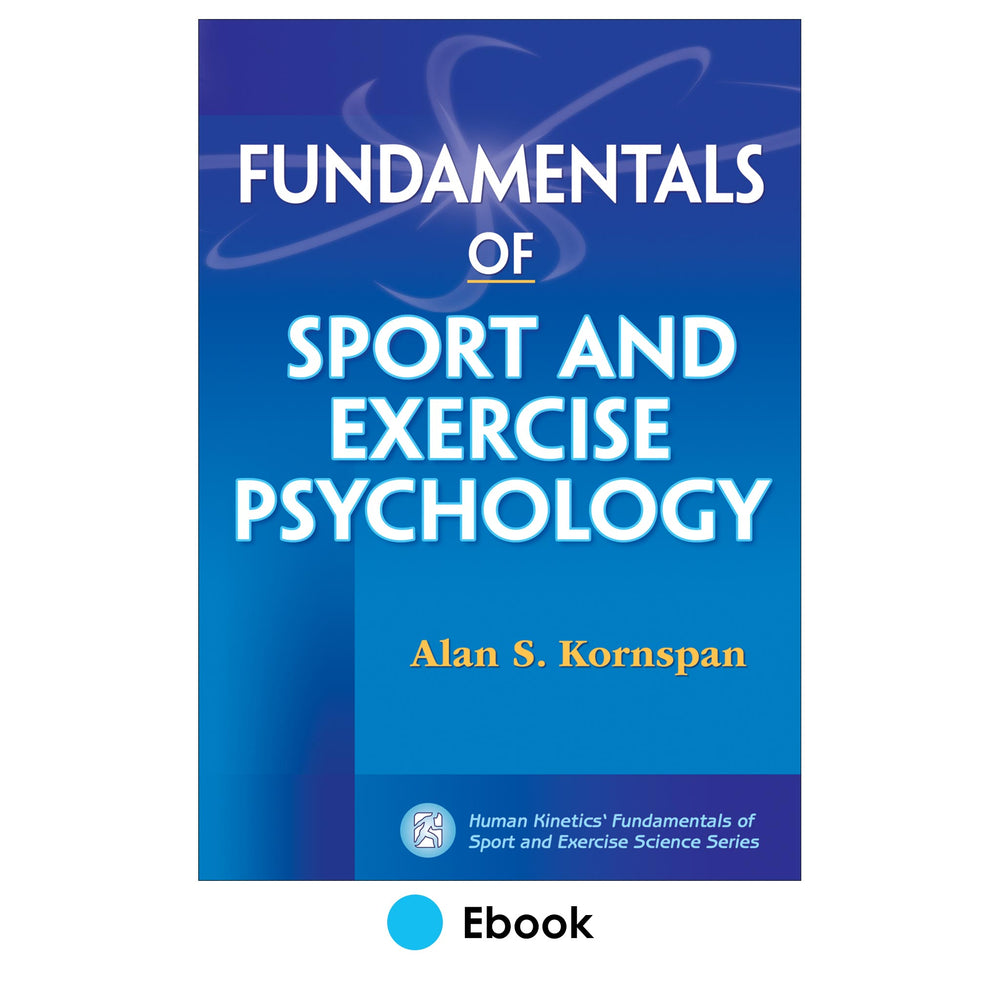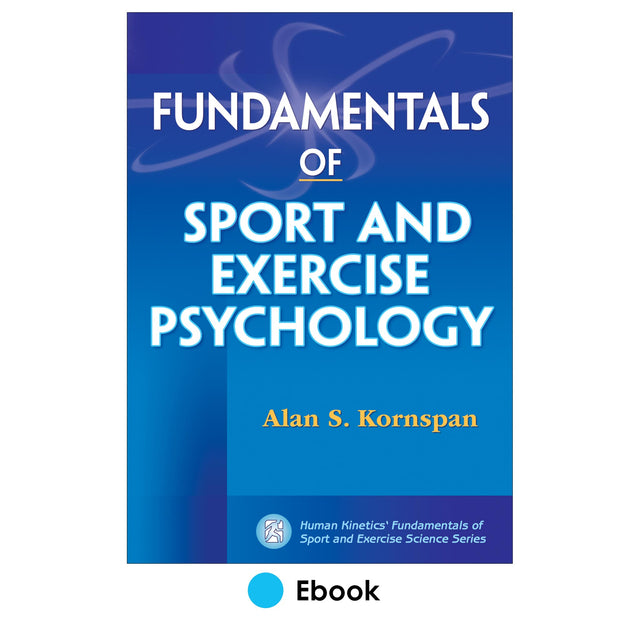Fundamentals of Sport and Exercise Psychology PDF
Author: Alan Kornspan
$30.00 USD
Access Duration: 10 Years
The e-book for Fundamentals of Sport and Exercise Psychology, is available at a reduced price and allows students to highlight, take notes throughout the text. When purchased through the Human Kinetics site, access to the e-book is immediately granted when the order is received.
Fundamentals of Sport and Exercise Psychology provides a preparatory look at the opportunities and goals in the field of sport and exercise psychology. Rather than focus on theory and concepts, this text answers basic questions for newcomers to the field by providing information on what sport and exercise psychology is and what it has to offer. It integrates applied and career information to show the basic principles of the field, contains information on where sport and exercise psychology professionals work, the types of jobs they hold, the services they provide, and the opportunities available to those thinking of entering the field.
Engaging for readers of all levels, this book provides a clear and motivating vision of the future of the field and an update of the various career opportunities available. Throughout the resource, many features bring the practical aspects of sport and exercise psychology to life for those wondering what sport and exercise psychology is all about:
-Success Stories highlight influential practicing sport psychologists and mental training consultants to give readers an idea of how researchers and professionals are applying their knowledge in jobs and the many possible career paths available.
-Psychological Insights pull readers into the text with quirky or surprising “Did you know?” facts.
-Numerous quotes emphasize what sport and exercise psychologists, practitioners, and athletes in the real world have to say about the topic at hand.
-Real-life examples introduce readers to the possibilities ahead and get them excited about where further study can lead.
-The appendixes contain additional resources that students can consult as they continue their career journey and provide tips for applying the principles of sport and exercise psychology in various professions.
Fundamentals of Sport and Exercise Psychology examines what sport and exercise psychologists do, what they study, and how these factors relate to the real world. Part I of the text presents an overview of exercise and sport psychology, its current status within kinesiology, and the various career paths available. Part II explores the key objectives for people actually working in the field. Each of the seven chapters in part II covers an area commonly discussed in sport and exercise psychology, giving readers a better understanding of the main directions and visions for the field. Readers will briefly look at how sport psychology professionals and educators enhance the performance of individual athletes and teams, teach others how to create a positive sport environment, assess the mental skills of athletes, care for injured athletes, and encourage involvement in exercise and fitness. The emerging areas of counseling athletes regarding life skills and clinical issues are also discussed.
This text is the first in the new Human Kinetics Fundamentals of Sport and Exercise Science series. The series helps students and professionals understand the basic topics, goals, and applications of the many subdisciplines in kinesiology. This and other books in the series provide a solid grounding that readers can use as a jumping-off point for further study.
Fundamentals of Sport and Exercise Psychology will leave students with a clear understanding of what sport and exercise psychology professionals do and where they work. Just as important, the book will motivate them to continue their exploration of the many rewarding career paths the field has to offer.
Instructions for downloading and accessing the e-book will be provided once the order is complete.
Adobe Digital Editions® System Requirements
Windows
-Microsoft® Windows® 2000 with Service Pack 4, Windows XP with Service Pack 2, or Windows Vista® (Home Basic 32-bit and Business 64-bit editions supported)
-Intel® Pentium® 500MHz processor
-128MB of RAM
-800x600 monitor resolutionMac
PowerPC
-Mac OS X v10.4.10 or v10.5
-PowerPC® G4 or G5 500MHz processor
-128MB of RAM
Intel®
-Mac OS X v10.4.10 or v10.5
-500MHz processor
-128MB of RAM
Supported browsers and Adobe Flash versions
Windows
-Microsoft Internet Explorer 6 or 7, Mozilla Firefox 2
-Adobe Flash® Player 7, 8, or 9 (Windows Vista requires Flash 9.0.28 to address a known bug)Mac
-Apple Safari 2.0.4, Mozilla Firefox 2
-Adobe Flash Player 8 or 9
Supported devices
-Sony® Reader PRS-505
Language versions
-English
-French
-German
Part I. Welcome to Sport and Exercise Psychology
Chapter 1. What Is Sport and Exercise Psychology?
Origins in Psychology and Physical Education
Psychology of Sport: 1900 to 1920
Psychology of Sport: 1920s and 1930s
Psychology of Sport: 1940s to 1960s
Psychology of Sport: 1970s to 1990s
Current Status of the Field of Sport Psychology
Professional Practice Issues in Sport Psychology
The Short of It
Chapter 2. What Can I Do With Sport and Exercise Psychology?
Academic Path
Professional Path
Other Paths Incorporating Sport and Exercise Psychology
The Short of It
Part II. Goals of Sport and Exercise Psychology
Chapter 3. Enhancing the Performance of Individual Athletes
Cognitive-Behavioral Model of Sport Consultation
Where Does Mental Training Occur?
What Mental Training Skills Are Taught to Athletes?
Research Support for Teaching Mental Skills to Athletes
Who Provides Performance Enhancement Services to Athletes?
The Short of It
Chapter 4. Enhancing the Performance of Teams
Overview of Team Building
Where Does Team Building Occur?
What Team-Building Activities Are Taught to Athletes?
Research Support for Teaching Team Building
Who Provides Team-Building Services to Sport Teams?
The Short of It
Chapter 5. Creating a Positive Sport Environment: Leadership, Motivation, and Communication
Importance of Creating a Positive Sport Environment
Where Do Coaches Learn to Create a Positive Environment?
What Methods Do Consultants Teach to Coaches?
Research Support for Providing a Positive Sport Environment
Who Provides Consulting on Positive Sport Environments?
The Short of It
Chapter 6. Assessing Athletes' Mental Skills
Overview of Assessment for Sport Organizations and Teams
Where Do Assessments Occur?
How Is Assessment Used in Sport Psychology?
Issues in Psychological Testing
Research Support for Using Assessments With Athletes
Who Provides Psychological Testing Services?
The Short of It
Chapter 7. Caring for Athletes: General Well-Being and Recovery From Injury
What Is Psychology of Rehabilitation From Athletic Injury?
How Do Athletes Respond to Injury?
Referrals to Sport Psychologists
What Interventions Are Provided to Injured Athletes?
Research Support for Injury Counseling
Who Provides Sport Psychology and Counseling Services to Injured Athletes?
What Are the Unique Developmental Concerns of Athletes?
Where Are Personal Development Services Provided and Who Provides Them?
Research Support for Personal Development Services
The Short of It
Chapter 8. Helping Athletes With Mental Health Issues: A Clinical Approach
What Is Clinical Sport Psychology?
Responsibilities of a Clinical or Counseling Sport Psychologist
Where Does Clinical Sport Psychology Take Place?
What Occurs in Clinical Sport Psychology?
Mental Health Issues Treated By Clinical Sport Psychologists
Research Support for Clinical Sport Psychology Services
Who Provides Clinical Sport Psychology Services?
The Short of It
Chapter 9. Using Psychology to Encourage Involvement in Exercise and Fitness
What Is Exercise Psychology?
Where Does Exercise Psychology Take Place?
What Services Are Provided in Exercise Psychology?
What Interventions Are Used in the Exercise Process?
Research Support for Exercise Psychology Services
Who Provides Exercise Psychology Services?
The Short of It
Epilogue
Appendix A: Learn More About Sport and Exercise Psychology
Appendix B: Tips for Implementing Sport and Exercise Psychology
References
Index





